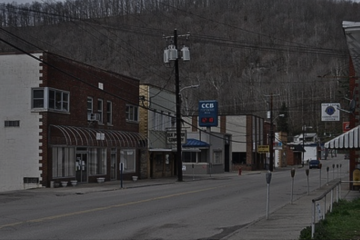by Crystal Good, writing for the “When All Are Counted” Project
In West Virginia, Black children’s experiences seem to only become visible in the data when they intersect with tragedy. Their stories remain hidden, overshadowed by silence, unless they end in suspension or death. It is a stark reality that we have precise data on Black maternal and infant mortality rates, which tells us the Black population of 3% (65,000) in West Virginia is 13.7 deaths per 1,000 compared to the state’s white infant mortality rate of only 6.8 deaths per 1,000. But even this ominous data comes with challenges. The state’s inadequate infrastructure hinders timely reporting, leaving a haunting reminder of the lives lost and unheard, especially the invisible Survivors: Black families who navigate these traumatic experiences with systems like health care, school systems, etc. and “survive.”
Little is known, if any, about the Black families who survive traumatic experiences of their children nearly perishing in “almost heaven”? Their narratives go uncounted, like those of Black children navigating the foster care system, juvenile detention, and other social service programs who age out or move out of state and take their “almost” stories with them.
Hesitant Obligations: State Agencies and the Lack of Transparency
State agencies responsible for collecting data, such as the WV Department of Health and Human Resources, Department of Education, Bureau of Juvenile Services, and Department of Social Services, seem hesitant to fulfill their obligations in reporting race-related information.
Less than two years ago, Commissioner for the Bureau of Social Services Jeffrey Pack updated a legislative oversight committee on the bureau’s foster care database. As reported on WCHSTV.com, Pack said, “It’s a case management system. It wasn’t designed to perform as a data reporting system.”
Too many agencies like the Marshall University Minority Health Institute, an office severely underfunded for years, don’t have any public facing data about African American Health, nor does DHHR offer any statistical information. I will note, however, that West Virginia African American Tobacco Prevention Network [WVAATPN] addresses tobacco prevention and cessation efforts at the grassroots level by partnering with faith-based and community-based organizations to carry out evidence-based programming that targets explicitly high-population areas with African Americans. The program is housed at the McDowell County Commission on Aging and is managed by Rhonda Robinson, Coordinator, and Shanita Evans, Assistant Coordinator.
But how many African Americans in WV smoke, how old are they, and how long have they been smoking? Maybe we will only know these answers when they die, and if anyone is paying attention, their death certificates will offer these insights.
Unanswered Questions: The Data Gap and Perpetuation of Racial Disparities
The lack of transparency becomes evident when reporters like Amelia Knisely, who has been covering the foster care system in West Virginia for years, seek answers from state agencies about the number of non-white children in specific programs. She can’t get the answer. No one can. So the data fails to reveal how many of these children were Black, further perpetuating their neglect as State responses remain elusive. This data gap perpetuates racial disparities in the state’s foster care, juvenile, and healthcare systems while alienating and hindering that inalienable right to pursue happiness.
Lost Voices: Are Black Children Running Away from West Virginia’s Foster Care System?
Who knows?!
For some, the pursuit of happiness means running away from West Virginia foster care. In 2022, more than 500 instances of children running away were recorded in West Virginia, primarily teenage boys, as WV Watch reported. Are Black children more likely to escape the WV foster care system? Without access to the data, it’s hard to say. In fact, as of December 31, 2022, WV DHHR cannot locate almost 10% of the children who ran away from foster care that year.
The West Virginia Department of Health and Human Resources (DHHR) has faced years of criticism for overseeing the foster care system, leading to restructuring and leadership changes. The State also grapples with lawsuits accusing it of failing to protect children and address an overwhelmed system. Such legal actions should demand transparency and public disclosure of data, including information about the number of affected Black children.
The issue of racial disparities in the juvenile justice system has been evident since a 2001 study highlighted the overrepresentation of minority youth. However, the data for the past several years isn’t there. Try to find the 2023 data. Avoiding data collection allows those in power to evade accountability, hindering progress toward a more equitable system.
Education and the Suspended Reality Of Black Children
Even in the education system, West Virginia’s Black children face high-risk factors for school suspension and continue to be suspended at disproportionate rates. Despite being aware of the problem for many years, little has changed. Many foster care students were suspended last year due to disciplinary issues, disproportionately affecting Black foster care students.
But we only know this because the West Virginia State Legislature passed a law requiring data collection on school disciplinary actions disaggregated by race and disability status to the Department of Education Civil Rights Data collection. After review, the data is eventually published, but there is a delay, and the most recent available data is from the 2017-2018 period. It is worth noting that before this legislation, contemporaneous data of this nature was not accessible. For more information, you can visit https://ocrdata.ed.gov/.
We cannot find Black children in West Virginia’s data until too late. Unless they are suspended from school or die, they do not count enough to be counted. This shroud of inadequate data hides the struggles Black children face day in, day out. Without knowing the numbers that tell us who, what, where, when, and why, how can we even begin to help them? How will we prove that help is needed? We will only break this cycle of invisibility when we embrace transparency, accountability, and appropriate action.
Black lives matter, and our stories deserve recognition and action. Informed by accurate data and directed by the people experiencing racial inequities, we can acknowledge the urgency of our current situation, utilize data to empower marginalized communities and effect positive change.

Crystal Good (she/her/hers) is a writer-poet, performer, and publisher whose work seeks to trouble the Appalachian narrative toward inclusion and a more truthful representation. She is the founder and publisher of Black By God THE WEST VIRGINIAN, a print and multimedia publication centering Black voices to address the information gap. Crystal is the author of “Valley Girl” her debut poetry collection and holds the entirely made up (but totally sincere) office of Social Media Senator for the Digital District of West Virginia to encourage digital and political literacy. Crystal tweets @cgoodwoman.



0 Comments